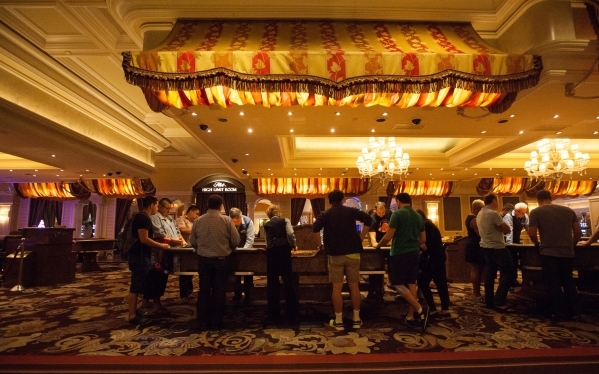Bellagio craps scheme defied 452 billion-to-1 odds
No one ever hit a five on the hop like they did.
To say that four men who pulled more than $1 million from Bellagio craps tables defied the odds would be something of an understatement.
The chances that they legitimately won as much as they did in one of their many sessions over the course of two years: 452 billion-to-1.
That's what MGM statistician Zachary Levine determined after analyzing the suspicious play of two Bellagio high rollers.
Anthony G. Granito and Jeffrey D. Martin won a hop bet — a high-risk verbal proposition — 19 times in 230 rolls in a session captured on video surveillance last year, according to recently released grand jury testimony.
"Their play over that period was so out of line with the mathematics that it's practically no way they could have been playing a fair game of chance," said Levine, who focuses on table games. "We have some very extreme high-end play at the Bellagio that can result in pretty wild swings, and we have some winners, so we're not saying that winning is impossible, just nobody, even bigger bettors, won to this level."
Gaming Control Board agents looked into the anomaly and determined that a pair of dealers were "throwing the game" to a couple of their friends.
Bail set
The alleged ringleader of the scheme, former dealer Mark M. Branco, 42, appeared before District Judge Valerie Adair on Tuesday in jail fatigues and shackles. He was ordered held on $160,000 bail. Martin, his 38-year-old brother-in-law, was given a $125,000 bail, and allowed time to come up with the money while out of jail.
Granito, 49, suffered chest pains last week when he learned of the 60-count indictment and was undergoing triple bypass surgery at the time of Tuesday's hearing, his lawyer told the judge. Another former Bellagio dealer, James R. Cooper Jr., 43, is now cooperating with authorities and expected to plead guilty on Thursday.
Between July 2012 and July 2014, when the timing was right, Branco and Cooper conspired with Granito and Martin to pay off bets that never transpired, Chief Deputy District Attorney J.P. Raman said.
Because the craps table is often crowded with base dealers, a boxman, a stickman, a floor person and other players, there had to be a "very select set of circumstances that had to line up for them to pull it off," the prosecutor said.
Granito and Martin would make some real bets, but mutter a hops wager as the dice were tossed and Cooper or Branco would pay them "as if they had bet on it," Raman said.
But last year, a fellow dealer noticed suspicious behavior and informed Bellagio management. Cooper told authorities the group had been running the scam for about two years, and Bellagio started tracking the records of the players.
Sometimes underpaid
Defense lawyer Andrew Leavitt, who wants to determine how much money was won legitimately, said Branco sometimes actually underpaid players.
"Not everybody who plays craps loses," he said. "Sometimes you win. And when you win, that's not cheating at gambling."
The scheme was not deeply sophisticated. The group simply played off a flaw in the craps setup, said Theodore Whiting, vice president of corporate surveillance for MGM Resorts.
At the time, a hop bet, which pays about 15-1, was not definitively marked on the table. (MGM has since added a spot for hop bets on the layout, Whiting said.)
Typically, any bet must be placed before the dice are in the air. But Granito and Martin would sometimes call out their phony bets after the shooter released. Only Branco or Cooper would claim to have heard their bets.
"Nobody really has any idea what that bet is because it's not clearly marked," Whiting testified. "This is ripe for cheating because we can't verify it from the eye. The floor can only verify it if they heard the bet."
When security teams watched Granito and Martin over one particular series, the hop bet "magically" won every time, Whiting testified.
An MGM fraud examiner learned of the player-dealer collusion and launched a background check on everyone involved. She testified that Martin was a former baseball player for the San Diego Padres, but his lawyer, Lucas Gaffney, could not confirm the information. BaseballProspectus.com lists him as a former player but gives no details about his career.
Biggest winners
When Levine analyzed their play over the course of more than 4,000 throws, they were two biggest winners at the casino, he said. The way they were betting, they should have ranked as two of the biggest losers.
Granito's average bet was $4,400. He played 1,624 rounds and wagered $7.1 million. He would have been expected to lose $459,539. Instead, he won $498,500. Martin wagered $5.1 million over 2,295 rounds. Bellagio should have expected to come away with $252,490 of his money. Instead, he won $587,900.
Overall, they would have been expected to lose $712,029, Levine testified, but they won a total of $1,086,400.
Had the two been playing by chance and independently, the probability of them winning at least the total amount they did is 1 in 501,171, according to Levine.
Whiting said he cautions surveillance workers to be on the lookout for hop bets.
"When you see a $500 or more bet, even at the Bellagio, that's a lot of money to bet on the hop. That's suspicious," he testified. "If you see that it wins, now it's really suspicious."
Contact David Ferrara at dferrara@reviewjournal.com or 702-380-1039. Find him on Twitter: @randompoker






















